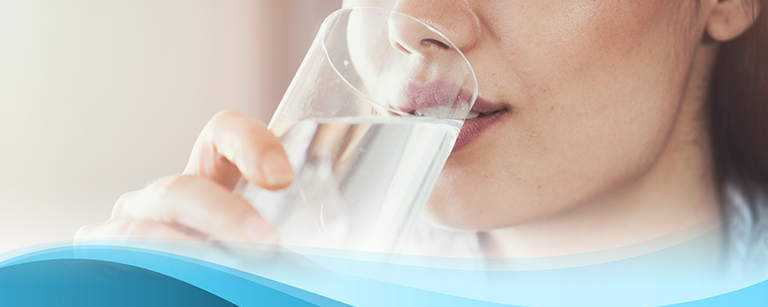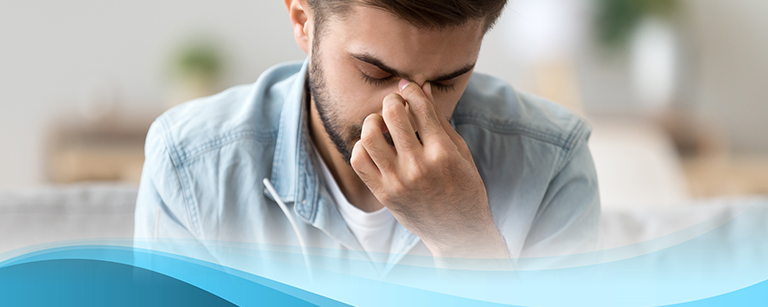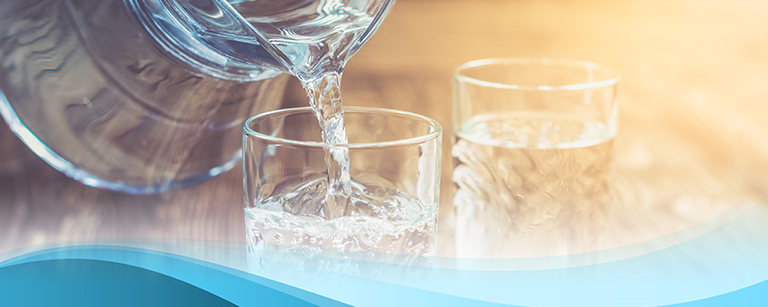The Importance of Proper Hydration
Posted by Kenton Jones on Jun 1st 2020

Our Multipure Spotlight this month is “Hydration Solution,” so for this article, we’re going to start with the basics: The Importance of Proper Hydration, covering the necessity of water toward body functions, the effects of dehydration, and tips to maintain proper hydration.
The average adult human body is made up of 65-75% water, as water is in every cell, from blood, to muscles, to organs, and even in the brain, which consists of 70-80% water. At its most basic level, hydration is the act of keeping our body parts full of water.
When we say “proper hydration,” one might think of the classic guideline of eight 8-oz glasses of water a day. But that guideline does not take into account variances in body size and weight. Modern guidelines for adequate water intake advises the following formula for proper daily hydration: Ounces of water to drink = ½ x (Body weight in pounds). So, someone who weighs 160 lbs. would need to drink ½ x 160, or 80 ounces of water. This is equivalent to ten 8-oz glasses of water a day.
Proper hydration has an effect on the maintenance and operation of the body’s:
- Blood pressure
- Mental sharpness and concentration
- Temperature regulation
- Body metabolism
- Joint lubrication
- Food digestion
- Body waste elimination
- Skin and hair

Effects of Hydration on Skin
In a previous article, we examined in detail the effects of hydration on skin and hair. In summary, we concluded that proper hydration :
- Keeps your collagen hydrated, which can result in smoother, less wrinkle-prone skin.
- Keeps your capillaries healthy, which can result in reduced puffiness and dark circles around the eyes.
- Improves microcirculation, improving density and thickness of skin layers.
Effects of Hydration on Hair
- Improves the health of the scalp, which can result in less dandruff development.
- Helps deliver nutrients to the scalp, allowing for fuller, more lustrous hair.
Effects of Hydration on Nutrition and Body Weight
Proper hydration can have positive effects on nutrition and body weight, as the water not only contributes to a feeling of fullness in the stomach (and thus discourages overeating), but can also balance or mitigate excessive levels of certain nutrients.
One study by the University of Illinois found that adults who increased their water intake by just one percent also simultaneously reduced their consumption of salt, cholesterol, sugar, and fat. This reduction is likely a result of the water consumption replacing or reducing the consumption of sugar-sweetened beverages and snack foods, which also correlates to a reduction in caloric intake.
Another study on hydration and weight loss found that increased hydration had a positive effect on the body’s ability to metabolize body fat, thus resulting in greater level of fat loss.
Furthermore, proper hydration can improve the gastrointestinal tract. Hydration allows for better nutrient absorption through the improvement of gastric secretions. Further down the intestines, proper hydration also allows for softer stools, reducing the risk of constipation and enabling more effective waste elimination.
Symptoms of Dehydration
Dehydration can occur through exercise, extreme temperatures, medical conditions or illnesses, or simply by not consuming enough fluids or water rich foods. Water is lost through urination and defection, through sweat, and even through breathing. While water lost through daily activities are typically replenished by daily water consumption, when not enough water is replenished, dehydration will show through several symptoms:
- Darker-colored urine, or little amounts of urine
- Constipation
- Dry mouth
- Fatigue
- Extreme thirst
- Decreased concentration
- Headache
- Dizziness, lightheadedness, or confusion
- Little to no tears when crying
Effects of Dehydration on Skin
The skin’s health is maintained through oils and proteins, both of which are reduced by a lack of proper hydration. This leads to the following negative effects on skin:
- Dry, cracked, or rough skin
- Redness
- Itching
- Scaling, flaking, or peeling
- Dull complexion
- Sunken or darkened skin around the eyes
- Increased wrinkling and aging signs
Effects of Dehydration on Muscles
Proper hydration is essential to proper blood circulation, as 80% of blood is made up of water. This, in turn, makes hydration important to muscles, both to transport oxygen and nutrients to muscles, and to transport waste byproducts (i.e., lactic acid) away from muscles during and after exercise.
Dehydration’s effects on muscles are demonstrated through several possible negative symptoms:
- Muscle fatigue
- Muscle cramps
- Muscle spasms
- Delayed-onset muscle soreness (DOMS)
Effects of Dehydration on the Brain
Because the brain’s composition is 70-80% water, dehydration can substantially affect cognitive ability. The brain is a very complex organ, whose organic chemistry is carefully balanced and maintained. Reducing its water levels can have a profound impact on its ability to effectively function. Even just a 1% dehydration in the brain can negatively affect mood, memory, concentration, and motor skills.
Dehydration’s effects on the brain are exacerbated by the fact that dehydration indicators do not occur in real time by the brain; by the time the brain understands that the body is becoming dehydrated, organs and tissues have already experienced symptoms of dehydration. In the brain, that means that mood swings and loss of concentration are already occurring by the time you are aware of your dehydration. Studies even suggest that the effects of dehydration on the brain’s ability to perform are similar to the effects of alcohol intoxication.
Effects of Overhydration
While not as common an occurrence as dehydration, overhydration – the intake and presence of an excessive amount of water in the body – can be just as harmful to your health. Overhydration can occur when more than 32 ounces (1 quart) of water have been consumed in an hour or less; this is equivalent to drinking four 8-oz glasses of water. While the body will naturally attempt to dispose of excess water through urination, overhydration can overtax the kidneys, causing the additional water to be stored in other cells and tissues. This causes the body’s sodium levels to become unbalanced; salt and other electrolytes become too diluted, which negatively impacts cellular function. With too much water, cells begin to swell, and in the brain, this can lead to confusion and even brain damage. Rapid overhydration, where electrolytes drop too low too quickly, can even lead to death.
Symptoms of overhydration include:
- Nausea and vomiting
- Headache
- Confusion or disorientation
- Muscle weakness, spasms, or cramps
- Seizures
- Coma

Tips for Proper Hydration
Given the dangers of both dehydration and overhydration, and the importance of proper hydration on body function, here are some tips to achieve and maintain proper hydration:
- Make drinking water part of your daily routine; start your day with a glass of water, and drink small to moderate amounts of water several times a day.
- Eat foods that are water-rich, like fruits and vegetables. Note that coffee, soda, milk, juice, and alcohol are not adequate alternatives to hydration, and in some cases may cause dehydration due to diuretic effects. Some recommend to “offset” each cup of non-water beverage consumed with a cup of water consumed – this is especially true when drinking any alcoholic beverage.
- Be aware of the signs of dehydration, especially during exercise or during hot days; dark urine, fatigue, or mental dullness are common signs of dehydration.
- Keep a reusable water bottle filled with Multipure water with you when leaving the house.
- When feeling hungry, drink water; thirst is often confused with hunger.
- Especially when working out or if you have been sweating, supplement water intake with electrolyte drinks such as coconut water in order to replenish lost sodium and maintain your body’s electrolyte balance.
- Use a Multipure drinking water system to ensure yourself the cleanest, healthiest water for proper hydration.
With all this in mind, we hope you understand more about the importance of proper hydration. Spread the word to others, and help them Taste the Difference of Multipure and stay hydrated.

